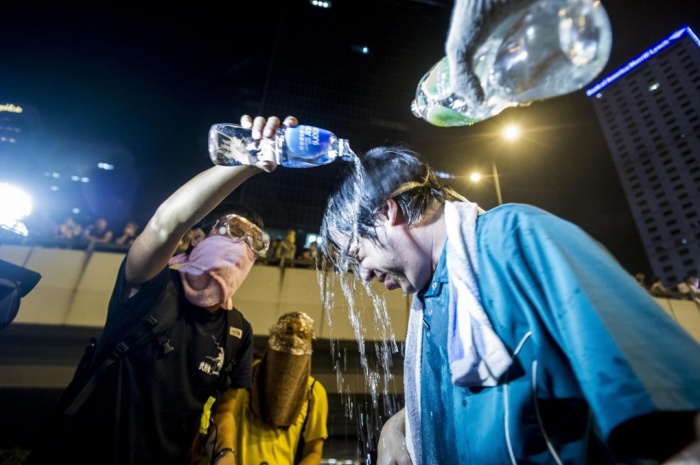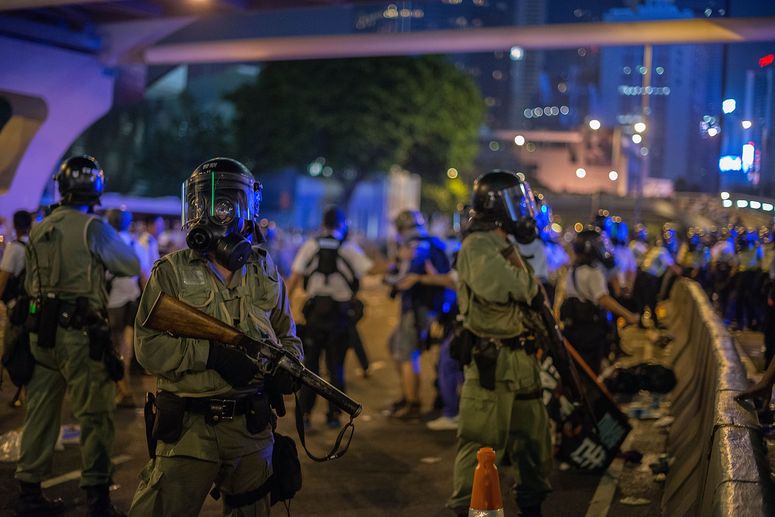All You Need To Understand The Hong Kong Protests That Happened Over The Weekend
What started out as student protests demanding for democratic reforms turned into a tussle with the Hong Kong authorities resorting to tear gas and pepper sprays. The demonstrations turned into chaos as Hong Kong citizens cling on dearly to the fundamental freedom they feel is being taken away from them.
Hong Kong Is Embroiled In Its Worst Political Protest Since China Took Control Of The Sovereign State Two Decades Ago
Hong Kong is in the midst of its longest series of political protests since the 1997 handover. Pro-democracy activists say they are making good on a long-threatened vow to try and paralyze the city's financial district -- a key business hub for the region and beyond -- through sit-ins and civil disobedience.
cnn.comOn Sunday, Riot Police Fired Tear Gas And Pepper Spray On Pro-Democracy Protestors, Including Students, After Launching A Baton Charge
Riot police have occasionally wielded batons against protesters. They have also used pepper spray, and tear gas has been deployed against more than one group of protesters around the Central Government Offices. There were more reports of tear gas early Monday. Protesters wore goggles or masks and raincoats, and many held umbrellas to protect against the possible use of pepper spray.
cnn.comPolice had used pepper spray on the students, which sparked thousands of city residents to come to the site and watch the arrests from overhead skywalks chanting to police, "don't harm the students."
wsj.comAbout 3,000 people have also blocked a major road across the bay in Mongkok while a crowd of about 1,000 faced police in the busy shopping district of Causeway Bay, east of central Hong Kong.
Dozens Have Been Reported Injured By The Authorities While More Were Arrested During The Protests
Police said they had arrested 78 people on Sunday on charges of "forcible entry into government premises, unlawful assembly, disorderly conduct in public place, assaulting public officers and obstructing police officers in due execution of duties". It comes after the arrest of more than 70 people in Saturday's protests, including prominent student activist leader Joshua Wong, who has since been released.
"If today I don't stand up, I will hate myself in future," said taxi driver Edward Yeung, 55, as he swore at police on the frontline. "Even if I get a criminal record it will be a glorious one."
To Understand What Triggered The Protests, One Has To Understand Hong Kong's "One Country, Two Systems" Handover Agreement With China:
Hong Kong, a former British colony, was handed back to China in 1997 following a 1984 agreement between China and Britain. Britain and China sign an agreement where Hong Kong is guaranteed "a high degree of autonomy, except in foreign and defence affairs" for 50 years following the handover in 1997.
As part of the handover, the Chinese government in Beijing promised to let Hong Kong keep its special rights and its autonomy — a deal known as "one country, two systems."
 vox.com
vox.com
A big part of that deal was China's promise that, in 2017, Hong Kong's citizens would be allowed to democratically elect their top leader for the first time ever. That leader, known as the Hong Kong chief executive, is currently appointed by a pro-Beijing committee. In 2007, the Chinese government reaffirmed its promise to give Hong Kong this right in 2017, which in Hong Kong is referred to as universal suffrage — a sign of how much value people assign to it.
 vox.com
vox.com
As Hong Kong 2017 Election Looms, Pro-Democracy Protestors Are Demanding For The Democratic Rights That China Once Promised But Does Not Seem To Be Delivering
But there have been disturbing signs throughout this year that the central Chinese government might renege on its promise. In August, Beijing announced its plan for Hong Kong's 2017 elections. While citizens would be allowed to vote for the chief executive, the candidates for the election would have to be approved by a special committee just like the pro-Beijing committee that currently appoints the chief executive. This lets Beijing hand-pick candidates for the job, which is anti-democratic in itself, but also feels to many in Hong Kong like a first step toward eroding their promised democratic rights.
 vox.com
vox.com
Protesters want the Chinese government to scrap rules allowing it to vet Hong Kong's top leader in the 2017 poll.
The Week-Long Protests Started On Wednesday With Student Groups Boycotting Classes And Leading Peaceful Marches In Demand For Democratic Reforms
Thousands joined a sit-in organised by students outside government headquarters this weekend, bolstering a week-old protest, which began as a strike by students calling for democratic reforms.
On Wednesday, student groups led peaceful marches to protest China's new plan for Hong Kong's 2017 election, which looked like China reneging on its promise to grant the autonomous region full democracy. Protest marches are pretty common in Hong Kong so it didn't seem so unusual at first.
 vox.com
vox.com
On Saturday, The Occupy Central Movement Joined The Rally With Peaceful Sit-Ins At Government Headquarters And Financial Districts
The protest movement developed into a much larger, more inclusive display of defiance as the Occupy Central movement joined the students' rally early Sunday. The pro-democracy advocacy group, which is not affiliated with the broader anti-capitalist Occupy movement, has been vowing to lead a campaign of civil disobedience in the face of China's decision to control what candidates can run for Hong Kong's top office.
cnn.comOccupy Central had originally planned to paralyse the central business district next Wednesday, October 1, to mark a national holiday celebrating communist China's founding. But organisers advanced the protest and changed the location in an apparent bid to harness momentum from student protests.
The movement aims to paralyze the key business area and thereby pressure Hong Kong and mainland Chinese authorities to revise their election plans.
Things Took A Turn For The Worst When Hong Kong's Authorities Crack Down With Surprising Force, Leading To Chaos
The really important thing is what happened next: Hong Kong's police cracked down with surprising force, fighting in the streets with protesters and eventually emerging with guns that, while likely filled with rubber bullets, look awfully militaristic. In response, outraged Hong Kong residents flooded into the streets to join the protesters, and on Sunday police blanketed Central with tear gas, which has been seen as a shocking and outrageous escalation. The Chinese central government issued a statement endorsing the police actions, as did Hong Kong's pro-Beijing chief executive, a tacit signal that Beijing wishes for the protests to be cleared.
 vox.com
vox.com
Hong Kong Government Says Citizens Should Accept The Deal Of Election Reform Offered By Beijing Where The Chinese Government Will First Approve The Candidates
The Hong Kong government says its people should accept the deal on electoral reform offered by Beijing. The new framework will allow Hong Kong's 5 million registered voters to select their leader, although candidates must be approved by a committee similar to the one that selected the city's top official in 2012.
cnn.comCritics say that this means only candidates favored by Beijing will appear on the ballot, but Hong Kong's current chief executive, C.Y. Leung, writing in an op ed for CNN, says that this is not the case. "We have not even started to discuss the detailed but crucial aspects of the nominating process for potential chief executive candidates," he writes. "Raw emotion -- for or against the proposed political reform -- will get us nowhere."
cnn.comThe China Central Government Has Condemned The Protest, Saying That Openly Nominating Candidates Would Create Chaos
Chinese leader Xi Jinping has been seen as encroaching on Hong Kong's autonomy.
Image via vox-cdn.comChina has defended its ruling on election candidacy. Li Fei, the deputy secretary general of the National People's Congress Standing Committee, said that openly nominating candidates would create a "chaotic society" and that any chief executive must "love the country". China has condemned the pro-democracy protests and called the unofficial referendum a "farce".
The Chinese central government said that it is "confident" that the Hong Kong government can handle the movement lawfully, according to a report in Chinese state media. The Chinese government opposes all illegal activities that "could undermine rule of law and jeopardize 'social tranquility,'" the report says.
cnn.comThey Are Censoring Information About The Situation In Hong Kong From China's Cyberspace As The Ghost Of The Tiannanmen Square Massacre Lives
As long as the protests continue, there is a chance they will spread to the mainland, where many are unhappy with one-party rule. The Chinese government is taking clear steps to limit information about events in Hong Kong by censoring internet search terms and forums discussions.
The other thing you have to understand is that the memory of the 1989 Tiananmen Square massacre, in which the Chinese military mowed down 2,600 peaceful pro-democracy protesters in Beijing and other cities, looms awfully large in Hong Kong. While Hong Kong was unaffected by the massacre (it was under British rule at the time), the city holds an annual vigil in memory of the event, which has been so heavily censored in China itself that many young people have never heard of it.
 vox.com
vox.com
Hong Kongers feel they have a responsibility to keep memory of Tiananmen for the fellow Chinese who cannot, but they also earnestly fear that it could happen to them. So that is a big part of why Hong Kong's residents are so upset to see their police donning military-like uniforms and firing tear gas this weekend; it feels like an echo, however faint, of 1989's violence.
 vox.com
vox.com
It Is Also Important To Note That Not Everyone In Hong Kong Supports The Protest For Full Autonomy From China
Pro-Beijing groups, such as Silent Majority for Hong Kong and Caring Hong Kong Power have emerged, criticising pro-democracy activists for "endangering" the city. They argue that continued civil disobedience and opposition to Beijing would only damage the city's reputation and economy, as well as its relationship with China.
Protests Have Simmered Down On Monday, But Tension Is Still High
People in Hong Kong have long wondered whether the Chinese government, famous for its heavy-handed authoritarianism and its fear of democracy, would really allow Hong Kong to become fully democratic or even keep what freedoms it had under British rule. The 2017 election was going to be a test case.
 vox.com
vox.com
The Question Of Hong Kong's Future Is A Scary Thought For Its Residents - Will Hong Kong Remain Fundamentally Free, Or Will Beijing Slowly Impose Its Dictatorial Rule On A Nation That Cherishes Its Sovereignity?
So when China began to break its promises for the election, it raised a very scary question: is Beijing just going to erode Hong Kong's freedom a little bit, or is it going to impose the same dictatorial rule it uses in mainland China, one of the least free societies in the world?
 vox.com
vox.com
So these protests aren't just about Beijing's plan to hand-pick candidates for the 2017 election, they're about whether Hong Kong will remain fundamentally free, an ongoing and open-ended question that will continue for years no matter how these protests resolve.
 vox.com
vox.com














